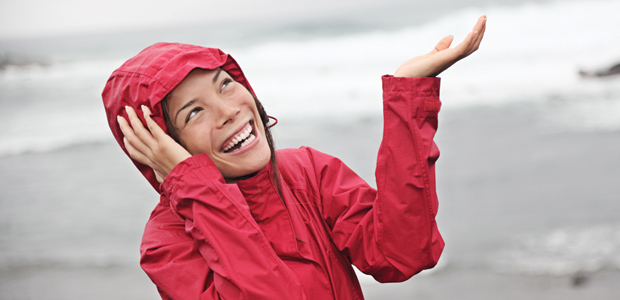Advertisement
Busting Cold and Flu Myths
Stay healthy this winter

Got the sniffles? “Having a cold is an excellent way to enhance your health by stimulating the immune system,” says Carissa Doherty, a naturopathic doctor.
But before we can strengthen our immune system, we must unravel the mysteries of colds and flu. These myth busters are from naturopathic and traditional doctors who know a few uncommon things about the common cold.
Does cold weather—and wet hair—lead to colds?
You’d better believe it! According to Susan Biali, MD, author of Live a Life You Love: 7 Steps to a Healthier, Happier, More Passionate You (Beaufort, 2010), “A classic study showed that when people had their feet put in a bowl of ice cold water, they were more likely to catch a cold shortly after.” She adds, “Another more recent review found that being outside in cold temperatures and inhaling cold air made you more likely to catch both upper (e.g., colds) and lower (e.g., pneumonia) respiratory tract infections.”
Biali explains that the physical stress of cold weather can predispose us to catching a virus. “Stress typically dampens our immune system’s ability to respond to invaders,” she says. “Inhaling cold air can actually cause blood vessels in the mouth and throat to contract, making your body less able to protect itself.”
Wet hair in cold weather can lower our defences even further.
Should we stay away from drafts to avoid colds and flu?
In Chinese medicine, ‘wind’ is considered a conduit for foreign invaders into the body,” says Mubina Jiwa, a naturopathic physician in Toronto. “When wind invades your body, it is combatted by your qi (vital energy). If your qi is depressed, you may end up sick. I wouldn’t necessarily avoid drafts … but in windy weather I recommend protecting your nose and mouth so you’re less susceptible.”
Winnipeg-based Sara Korsunsky, ND, adds, “Qi pools at the backs of our necks and lower backs. These ‘wind gates’ need to be covered to protect wind or cold from entering our bodies and causing imbalances. Scarves and longer coats protect our wind gates.”
Do kisses spread colds or flu?
You bet. And smooching isn’t the only way to invite invaders! Say I have a cold and rub my eyes—or I sneeze and cover my nose and mouth with my hand. After we shake hands, you’re vulnerable to viral invasion if you rub your eyes or nose. That’s why washing our hands frequently is so important.
“Viruses can also be passed indirectly,” says registered pharmacist Gary Kracoff, ND. “For instance, if I hold a pole on the bus and later you hold the same pole, you’re vulnerable.”
Should we take aspirin/acetaminophen at the first sign of a low-grade fever?
Vancouver-based Aaron Van Gaver, ND, doesn’t recommend this because a low-grade fever is our body’s normal response to a flu. “The body’s immune system works optimally at a slightly higher than normal temperature,” he says. “A low-grade fever will ensure a quicker resolution to the flu. Suppressing fever with aspirin or acetaminophen weakens the body’s immune system.”
He adds that if a fever reaches 102 F (38.9 C), fever-lowering medications may be necessary—especially for infants and small children.
Is chicken soup really an effective flu buster?
Research from the University of Nebraska shows that chicken broth slows the movement of white blood cells (neutrophils) that cause congestion. This helps clear clogged nasal passages.
“There’s nothing a little TLC can’t help,” says Jiwa. “Chicken has ‘feel good’ amino acids. And if you make the soup using the bones, you increase the nutritional value. Add vegetables, and you have a well-balanced, soothing meal.”
Research also shows that a hot drink can relieve coughing, sneezing, sore throat, runny nose, and chills. Hot drinks and homemade soups are inexpensive, safe, effective, yummy cold “remedies.”
Is it dangerous to exercise when we have a virus?
“Exercise is an excellent way to get the blood circulating, boost the lymphatic system, and get viral ‘junk’ out of the body,” says Doherty. “Exercise can also elevate your core body temperature, which can help fight viruses and shorten the length and severity of the illness. However, if you’re exhausted, you need to let your body rest and heal.”
Dr. Biali agrees, “Sometimes I’ll go to a dance class feeling like I’m coming down with something, but leave feeling completely energized and much better.”
However, she says some viruses can actually infect the heart if we exercise while sick. If we’re quite unwell, we should use our energy to recover—and talk to a health care practitioner.
Whether you’re sick or not, ’tis the season to savour mugs of hot stuff and keep your favourite scarf wound ’round your neck. Temperatures are falling, Christmas is just around the corner, and cold viruses are on the prowl.
Supplements to boost the immune system
“Some herbs and supplements may help prevent colds and flus,” says Kracoff. “For example, echinacea, eleuthero, and vitamin C are commonly said to be preventive. Some studies show they help, and some don’t.”
Supplements to support the immune system:
- vitamin C
- garlic
- echinacea
- astragalus
- eleuthero
Supplements can rev up the immune system and keep us healthy—but before using them, talk with someone knowledgeable. “For the most part they’re quite safe, but some people with some health conditions need to be careful,” says Kracoff.




